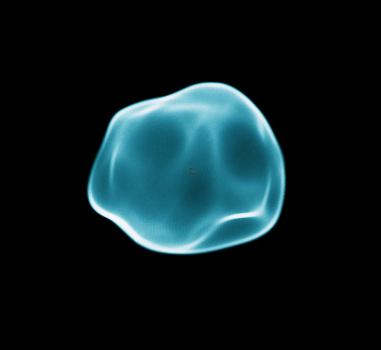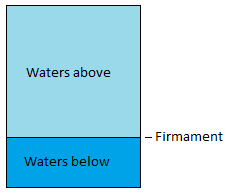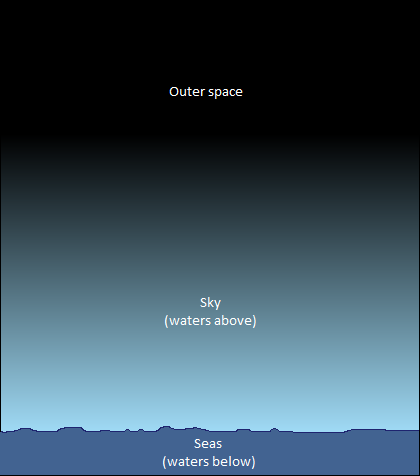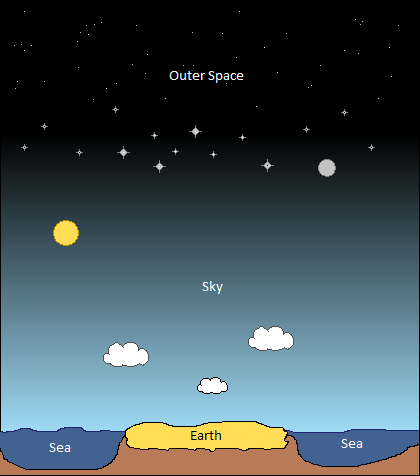The Firmament
In Hebrew the word "firmament" is translated as "expanse".
Expanse means "a wide continuous area of something".
The firmament then is "an expanse of something". What it is an expanse of needs to be determined from the context.
The Heavens
To understand the firmament we also need to understand the word "heaven" which is closely related to the word "firmament".
There are three heavens, so when the Bible uses the word "heaven" we must look at the context to determine which one it is.
| Heaven | Also known as | Context |
| First Heaven | Sky | Birds |
| Second Heaven | Outer Space | Sun, moon, and stars |
| Third Heaven | Heaven | God's throne, and angels |
The third heaven is not really mentioned in Genesis 1, so we can ignore that for now.
Day 1
In the beginning God created the heaven and the earth. And the earth was without form, and void; and darkness was upon the face of the deep. And the Spirit of God moved upon the face of the waters. And God said, Let there be light: and there was light. And God saw the light, that it was good: and God divided the light from the darkness. And God called the light Day, and the darkness he called Night. And the evening and the morning were the first day.
- Genesis 1:1-5 (KJV)
So the end result of Day 1 would be something like this:

- By Alex Verlan
A lump of 'clay' in the hands of the Creator.
Day 2
And God said, Let there be a firmament in the midst of the waters, and let it divide the waters from the waters. And God made the firmament, and divided the waters which were under the firmament from the waters which were above the firmament: and it was so. And God called the firmament Heaven. And the evening and the morning were the second day.
- Genesis 1:6-8 (KJV)
The first thing to note here is that God first says "Let there be a firmament" (explaining the concept), and then a verse later God makes the firmament. Only one firmament was ever created here of course.
It can also be seen that the purpose of the firmament was to divide the waters from the waters. The waters below (water in liquid form) are divided from the waters above (water in gas form).
There is a difference between what the firmament is (an expanse), and what it does (divide the waters).
Straight from the verses above it would look something like this:

However, as the day progresses the definition of the firmament changes a little, e.g. God now calls the firmament Heaven.
Because God called the firmament Heaven, we now know that these two words are compatible.
At that point the firmament (associated with heaven) becomes the Sky (or atmosphere).

Of all the water on Earth today about 4% (give or take) is in the atmosphere.
Day 4
And God said, Let there be lights in the firmament of the heaven to divide the day from the night; and let them be for signs, and for seasons, and for days, and years: And let them be for lights in the firmament of the heaven to give light upon the earth: and it was so. And God made two great lights; the greater light to rule the day, and the lesser light to rule the night: he made the stars also. And God set them in the firmament of the heaven to give light upon the earth, And to rule over the day and over the night, and to divide the light from the darkness: and God saw that it was good. And the evening and the morning were the fourth day.
- Genesis 1:14-19 (KJV)
Straight away we see a different terminology for the firmament here, e.g. "the firmament of the heaven", and we can see from the context (sun, moon, and the stars) that the firmament of the heaven now refers to the second heaven which is Outer Space.

Note that it's very hard to tell where the Sky turns into Outer Space. This "boundary" is said to be about 100 km up.
Day 5
And God said, Let the waters bring forth abundantly the moving creature that hath life, and fowl that may fly above the earth in the open firmament of heaven. And God created great whales, and every living creature that moveth, which the waters brought forth abundantly, after their kind, and every winged fowl after his kind: and God saw that it was good. And God blessed them, saying, Be fruitful, and multiply, and fill the waters in the seas, and let fowl multiply in the earth. And the evening and the morning were the fifth day.
- Genesis 1:20-23 (KJV)
Here's another slightly different way of referring to the firmament, e.g. "the open firmament of heaven", and we can see from the context (birds) that the firmament of heaven now refers to the first heaven which is the Sky.

- By The joy of all things / Wikimedia Commons / CC BY-SA 4.0
The word "open" refers to the lower end of the Sky.
The Firmament of Heaven
The firmament started out as just the Sky, but later "the firmament of heaven" is referring to the Sky and Outer Space.
The two are practically inseparable.
Some have suggested that "firmament" means "beaten out" (from the Hebrew word raqia, and its root word raqa), but I don't think that's correct. I think it means "stretched out".
The Bible confirms this:
I have made the earth, and created man upon it: I, even my hands, have stretched out the heavens, and all their host have I commanded.
- Isaiah 43:12 (KJV)
Also, there is no such thing as a solid sky. Most of the atmosphere is in gas form.

Given the definition of the word "firmament" (expanse, sky, atmosphere) I also see no need to add a dome, or an ice canopy, etc.
Conclusion
Why is this so difficult?
Well, to be honest, I don't think it was that difficult for the people that lived thousands of years ago. It's only difficult for us, because Hebrew is a completely different language to us. In Hebrew we really need to look at the context to see what is implied. That's how that language works, e.g. "a small number of words + context = true meaning".
The heavens declare the glory of God; and the firmament sheweth his handywork.
- Psalms 19:1 (KJV)

- By Anne Dirkse / Wikimedia Commons / CC BY-SA 4.0